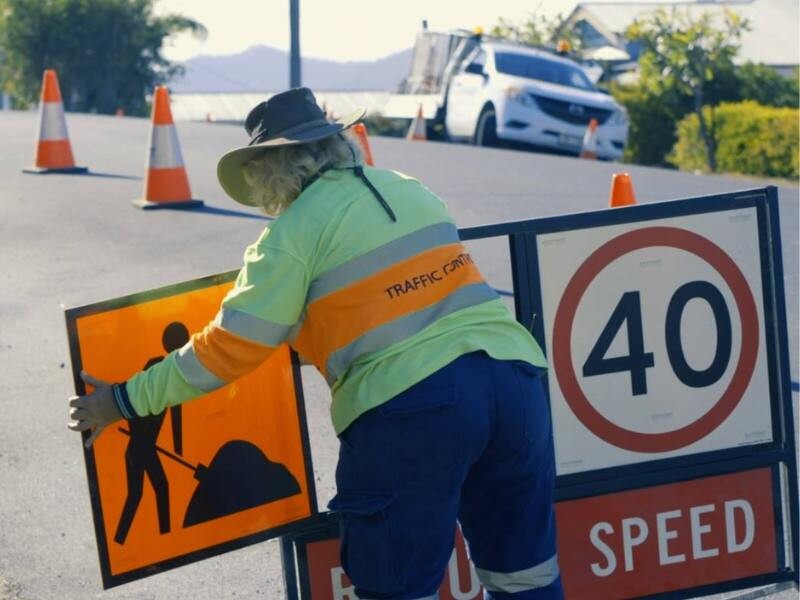If you’ve spent time on a roadwork site, you’ve probably seen the person calling the shots. They’re not holding the stop/slow bat, but they’re everywhere — walking the site, liaising with the site supervisor, managing signage adjustments and keeping everything running safely. That’s the TMI.
At East Coast Traffic Control, we rely on our Traffic Management Implementers (TMIs) to keep worksites moving, compliant and incident-free. And with projects expanding across QLD and NSW, we’re always looking for more.
So, what makes a great TMI? Here’s what we’ve learned from the ones we trust most.
They’ve got sharp eyes and even sharper planning skills
A good TMI doesn’t just follow the TMP — they read the site, anticipate problems and adapt in real time. They understand spacing, sightlines, taper lengths and pedestrian flow without needing to double-check every rulebook.
Whether it’s a simple lane closure or a complex multi-intersection detour, they can visualise how traffic will move and make sure everyone stays safe and compliant.
They stay calm when things get messy
The best TMIs aren’t rattled when things go sideways. A rainstorm hits, a subcontractor shows up unannounced, or a motorist ignores the signs — they’ve seen it before and know what to do.
They make fast, confident decisions and communicate clearly with traffic controllers, supervisors and site crew. They don’t escalate issues unless they have to. They keep things moving without cutting corners.
They understand the job site, not just the signage
Being a TMI isn’t just about knowing traffic control — it’s about understanding the broader construction environment. That includes:
- Communicating with builders, forepersons or council supervisors
- Working around plant and deliveries
- Managing pedestrian access near shops, schools or events
- Adjusting for emergency vehicles or high-volume periods
A great TMI sees the whole picture, not just the traffic.
They’re trusted by the crew and respected by the client
The TMI often acts as the link between the traffic control team and the builder or council. That means their communication skills are just as important as their technical knowledge.
The best ones:
- Set the tone on-site and lead by example
- Support newer crew members
- Flag potential risks early and offer solutions
- Keep clients informed without overwhelming them with jargon
Trust is earned by being competent, reliable and easy to deal with. That’s why good TMIs are requested again and again.
They’re qualified, prepared and professional
You can’t fake the TMI role. To work in the position, you need:
- Current TMI accreditation
- White Card
- Up-to-date knowledge of TMR or TfNSW traffic control requirements
- The ability to interpret and implement TMPs correctly
- Strong record-keeping and site documentation skills
- A calm, take-charge approach under pressure
We also value punctuality, clean presentation, and a commitment to site safety — every single time.
Why we’re always on the lookout
The demand for qualified TMIs is growing. Councils and contractors want crews that can self-manage, make smart decisions, and represent their project well in front of the public. That’s why we’re always looking to add experienced TMIs to our regional teams.
Whether it’s a night job in Brisbane, a water main repair in Lismore, or a multi-day rail upgrade near Gympie, we need TMIs who can step in and get things sorted.
Where we need TMIs right now
We currently have opportunities for accredited TMIs in:
- Sunshine Coast and Wide Bay (Hervey Bay, Bundaberg)
- NSW Mid North Coast (Grafton, Coffs Harbour, Kempsey, Armidale)
- Central QLD (Rockhampton, Gladstone)
- North QLD (Mackay, Townsville)
- South East QLD (Brisbane, Caboolture, Logan, Ipswich)
If you’re qualified, experienced and ready to lead from the ground up — we’d love to hear from you.
FAQs
What does a TMI actually do on-site?
They implement and manage traffic control setups according to the approved TMP. This includes placing signs, directing crews, communicating with site supervisors, and ensuring compliance throughout the shift.
Do TMIs still do manual traffic control?
Yes, in some cases. But their primary responsibility is managing the setup and ensuring the plan is correctly executed.
How is a TMI different from a TC?
A TMI has higher-level training and is responsible for implementing traffic management plans. TCs (Traffic Controllers) focus more on operating stop/slow, managing specific control points, and assisting under the direction of the TMI.
Can I apply as a TMI if I’ve only just finished my course?
We’re looking for experienced TMIs, but if you’re recently accredited and eager to gain experience, we may be able to roster you under a senior TMI to learn the ropes.
What’s the pay like for a TMI?
Rates vary depending on the job and region, but TMIs generally receive higher pay than general traffic controllers due to their qualifications and site responsibilities.





